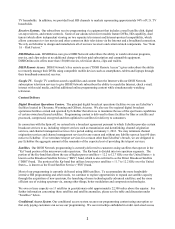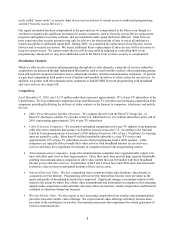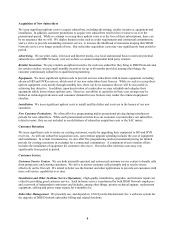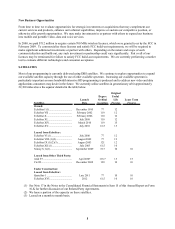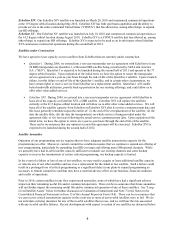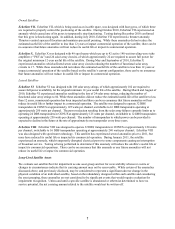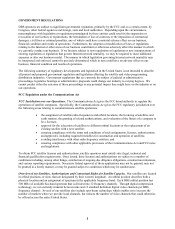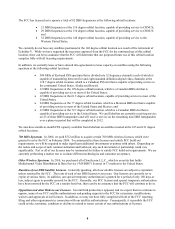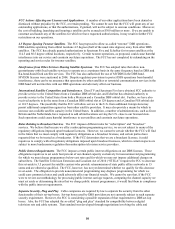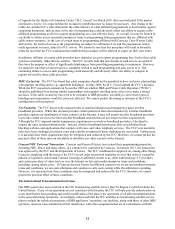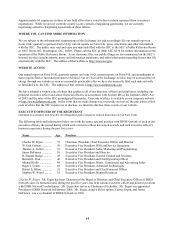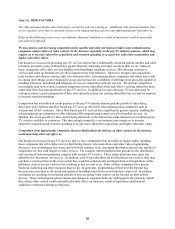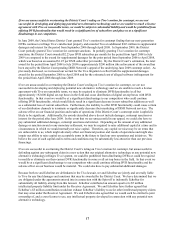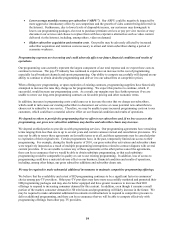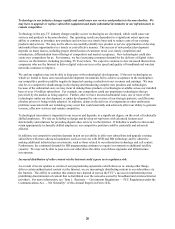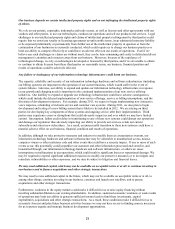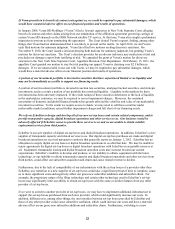Dish Network 2010 Annual Report Download - page 19
Download and view the complete annual report
Please find page 19 of the 2010 Dish Network annual report below. You can navigate through the pages in the report by either clicking on the pages listed below, or by using the keyword search tool below to find specific information within the annual report.12
12
of Appeals for the District of Columbia Circuit (“D.C. Circuit”) in March 2010, that court indicated if the market
continues to evolve, it is expected that the exclusivity prohibition may no longer be necessary. Any change in the
Cable Act and the FCC’s rules that permit the cable industry or cable-affiliated programmers to discriminate against
competing businesses, such as ours, in the sale of programming could adversely affect our ability to acquire cable-
affiliated programming at all or to acquire programming on a cost-effective basis. As a result, we may be limited in
our ability to obtain access on nondiscriminatory terms to programming from programmers that are affiliated with
cable system operators. In the case of certain types of programming affiliated with Comcast, Time-Warner Cable,
and Liberty, the terms of access to the programming are subject to arbitration if we and the programmer cannot
reach agreement on terms, subject to FCC review. We cannot be sure that this procedure will result in favorable
terms for us or that the FCC conditions that establish this procedure will be allowed to expire on their own terms.
In addition, affiliates of certain cable providers have denied us access to sports programming they feed to their cable
systems terrestrially, rather than by satellite. The FCC recently held that new denials of such service are unfair if
they have the purpose or effect of significantly hindering us from providing programming to consumers. However,
we cannot be sure that we can prevail in a complaint related to such programming and gain access to it. Our
continuing failure to access such programming could materially and adversely affect our ability to compete in
regions serviced by these cable providers.
MDU Exclusivity. The FCC has found that cable companies should not be permitted to have exclusive relationships
with multiple dwelling units (e.g., apartment buildings). In May 2009, the D.C. Circuit upheld the FCC’s decision.
While the FCC requested comments in November 2007 on whether DBS and Private Cable Operators (“PCOs”)
should be prohibited from having similar relationships with multiple dwelling units, it has yet to make a formal
decision. If the cable exclusivity ban were to be extended to DBS providers, our ability to serve these types of
buildings and communities would be adversely affected. We cannot predict the timing or outcome of the FCC’s
consideration of this proposal.
Net Neutrality. The FCC has recently imposed rules of nondiscrimination and transparency upon wireline
broadband providers. While this decision provides certain protection from discrimination by wireline broadband
providers against our distribution of video content via the Internet, it may still permit wireline broadband providers
to provide certain services over their wireline broadband network that are not subject to these requirements.
Although the FCC imposed similar transparency requirements on wireless broadband providers, it declined to
impose the same nondiscrimination rule. Instead, wireless broadband Internet providers are prohibited from
blocking websites and applications that compete with voice and video telephony services. The FCC’s net neutrality
rules have been challenged in federal court and could be overturned if those challenges are successful. Furthermore,
it is uncertain how these requirements may be interpreted and enforced by the FCC; therefore, we cannot predict the
practical effect of these rules on our ability to distribute our video content via the Internet.
Comcast/NBC Universal Transaction. Comcast and General Electric have joined their programming properties,
including NBC, Bravo and many others, in a venture to be controlled by Comcast. In January 2011, the transaction
was approved by the FCC and the Department of Justice. The FCC conditioned its approval on, among other things,
Comcast complying with the terms of the FCC's recent order on network neutrality (even if that order is vacated by
judicial or legislative action) and Comcast licensing its affiliated content to us, other traditional pay-TV providers
and certain providers of video services over the Internet on fair and nondiscriminatory terms and conditions,
including, among others, price. If Comcast does not license its affiliated content to us on fair and nondiscriminatory
terms and conditions, we can seek arbitration and continue to carry such content while the arbitration is pending.
However, it is uncertain how these conditions may be interpreted and enforced by the FCC; therefore, we cannot
predict the practical effect of these conditions.
The International Telecommunication Union
Our DBS system also must conform to the ITU broadcasting satellite service plan for Region 2 (which includes the
United States). If any of our operations are not consistent with this plan, the ITU will only provide authorization on
a non-interference basis pending successful modification of the plan or the agreement of all affected administrations
to the non-conforming operations. Accordingly, unless and until the ITU modifies its broadcasting satellite service
plan to include the technical parameters of DBS applicants’ operations, our satellites, along with those of other DBS
operators, must not cause harmful electrical interference with other assignments that are in conformance with the


